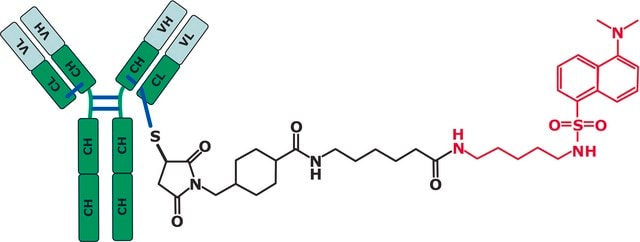推荐产品
一般說明
Standardization of sample analysis is currently needed in microbiome genomics research workflow. Lack of standardization can lead to biases and errors in common processes during sample preparation and analysis such as sample amplification, sequencing and bioinformatics analyses.1 Genomics standardization kit from Porphyromonas gingivalis can serve as standard for benchmarking the performance along the workflow of microbiomics or meta-genomics analyses and as a tool to increase reproducibility and allow comparison of results obtained by different labs.
P. gingivalis, is a gram-negative anaerobe bacterium which is an etiologic agent of adult periodontitis, a chronic inflammatory disease characterized by the destruction of the supportive tissue surrounding teeth. P. gingivalis usually inhabits the oral cavity, being a member of the oral microbiome along with more than 500 other bacterial species.2 Studies have shown that LPS from P. gingivalis plays an important role in this disease. 3-6 The association of the oral microbiota, including P. gingivalis, with various pathological states has been reported. These include development of Alzheimer′s disease7, role in oral cancers8, preterm birth9 and rheumatoid arthritis.10 Studies show that in mice, oral administration of P. gingivalis induced a change in gut microbiota composition, which in turn affects the host′s metabolic profile. Accumulating evidence suggests a profound effect of altered gut metabolite profiles on overall host health.11
View all Microbiome inactivated bacteria and DNA standard for your Metagenomics Research needs.
P. gingivalis, is a gram-negative anaerobe bacterium which is an etiologic agent of adult periodontitis, a chronic inflammatory disease characterized by the destruction of the supportive tissue surrounding teeth. P. gingivalis usually inhabits the oral cavity, being a member of the oral microbiome along with more than 500 other bacterial species.2 Studies have shown that LPS from P. gingivalis plays an important role in this disease. 3-6 The association of the oral microbiota, including P. gingivalis, with various pathological states has been reported. These include development of Alzheimer′s disease7, role in oral cancers8, preterm birth9 and rheumatoid arthritis.10 Studies show that in mice, oral administration of P. gingivalis induced a change in gut microbiota composition, which in turn affects the host′s metabolic profile. Accumulating evidence suggests a profound effect of altered gut metabolite profiles on overall host health.11
View all Microbiome inactivated bacteria and DNA standard for your Metagenomics Research needs.
應用
Suitable for DNA extraction, PCR, sequencing, next generation sequencing
特點和優勢
- Individual microbial standard for microbiomics and meta-genomics workflow
- Suitable standard for PCR, sequencing and NGS
- Improve Bioinformatics analyses
- Increases reproducibility
- Compare results lab to lab
成分
1. Microbial DNA standard from Porphyromonas gingivalis: The genomic DNA is provided at =10 ng/μl concentration in TE buffer pH 8.0. It is recommended to avoid freeze thaw cycles of this product.
2. Inactivated Porphyromonas gingivalis: The inactivated bacteria are provided at >10^8 bacteria/vial as lyophilized powder. It is recommended to avoid freeze thaw cycles of this product.
3. Resuspension Buffer: The Resuspension Buffer is used to reconstitute the lyophilized inactivated bacteria prior to genomic DNA extraction
2. Inactivated Porphyromonas gingivalis: The inactivated bacteria are provided at >10^8 bacteria/vial as lyophilized powder. It is recommended to avoid freeze thaw cycles of this product.
3. Resuspension Buffer: The Resuspension Buffer is used to reconstitute the lyophilized inactivated bacteria prior to genomic DNA extraction
準備報告
Inactivated Porphyromonas gingivalis
1. Thaw the lyophilized cells at RT for 5 min.
2. Use 1 ml of the supplied Resuspension buffer to resuspend the lyophilized cells, pipette until all the cells are suspended.
3. Transfer the resuspended cells to a clean 1.5ml Eppendorf tube.
4. The resuspended bacteria can be used as control and/or spike-in for gDNA extraction from microbiome samples.
It is recommended to avoid long-term storage of the resuspended cells.
1. Thaw the lyophilized cells at RT for 5 min.
2. Use 1 ml of the supplied Resuspension buffer to resuspend the lyophilized cells, pipette until all the cells are suspended.
3. Transfer the resuspended cells to a clean 1.5ml Eppendorf tube.
4. The resuspended bacteria can be used as control and/or spike-in for gDNA extraction from microbiome samples.
It is recommended to avoid long-term storage of the resuspended cells.
儲存類別代碼
10 - Combustible liquids
商品
DNA standards enhance metagenomics research integrity, offering precise species study and mixed community standards.
我们的科学家团队拥有各种研究领域经验,包括生命科学、材料科学、化学合成、色谱、分析及许多其他领域.
联系技术服务部门








